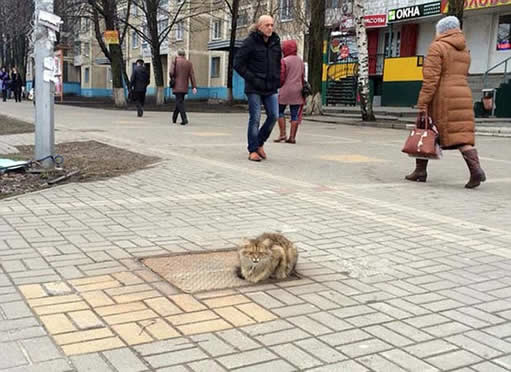2016-04-12 11:36
一只貓貓?jiān)谄浔贿z棄的地方,無(wú)論寒暑,堅(jiān)持等待她的主人回來(lái),這樣一副情景讓無(wú)數(shù)網(wǎng)民們淚奔。
The tale of a cat who sits faithfully waiting for its family to come back to the spot where it was abandoned has captured the hearts of internet users.
一只貓咪在其被遺棄的地方,無(wú)論寒暑地堅(jiān)持等待它的主人回來(lái),這樣一副情景讓無(wú)數(shù)網(wǎng)民們淚奔。
The sad story was posted on Vkontakte (Russian Facebook) by user Ostap Zadunayskly, where he compared the cat’s plight to that of Greyfriar’s Bobby, a Skye Terrier who spent 14 years guarding his owner’s grave.
這個(gè)悲傷的故事是由奧斯特(Ostap Zadunayskly)傳到Vkontakte(類似俄羅斯的臉書),奧斯特將這只貓咪比作英國(guó)的忠犬波比,波比是蘇格蘭長(zhǎng)毛短腿獵犬,它守候在死去主人的無(wú)名墓地旁直到 14 年后自己死去。
He first spotted the cat in Belgorod, south-west Russia, in summer 2015, and soon realised that it sits in exactly the same place every day.
2015年夏天,他在俄羅斯南東南部的別爾哥羅德第一次發(fā)現(xiàn)這只貓咪,隨后,他意識(shí)到這只貓咪每天都會(huì)蹲在同一個(gè)地方。
Ostap asked around and was told that the cat’s owners used to live in the area but sold up and moved out some time ago.
奧斯特打聽(tīng)了一下,才知道這只貓咪的主人以前住在這個(gè)區(qū)域,但是不久前賣掉房子,搬走了。
The story gets a bit over the top here; someone told him that they’d seen the cat running after the car when they drove off (not very cat-like behaviour) and that the cat has been waiting at the same spot for them to return “for years” (sure).
故事到這兒就有點(diǎn)兒到了高潮。有人說(shuō),他們?cè)匆?jiàn),當(dāng)主人全家搬離時(shí),這只貓咪追著那輛汽車跑(不太像一只貓會(huì)做的事情),而且從那以后,他們就看到,“多年來(lái)”,這只貓一直在一個(gè)地方等主人回來(lái)。
Locals have taken to feeding the cat, which might be a more credible explanation for why it stays put.
當(dāng)?shù)厝艘步?jīng)常會(huì)喂貓咪一些吃的,這也可能是這只貓為何會(huì)一直待在這個(gè)地方,更為合理的解釋。
Mr Zadunayskiy said: “This is a great example of human meanness and true animal loyalty."
奧斯特在他的文章中稱,這是人類的無(wú)情以及動(dòng)物的忠誠(chéng),最好的體現(xiàn)。
Many Internet commenters quoted from the book The Little Prince, written by Antoine de Saint-Exupery, saying, "You become responsible forever for what you’ve tamed."
許多網(wǎng)民引用安托尼.圣埃克蘇佩里所著《小王子》中的名言,“你將永遠(yuǎn)為你所馴服的東西負(fù)責(zé)。”
Or for what you’ve started feeding.
或者你開始喂養(yǎng)的。


